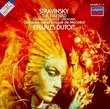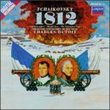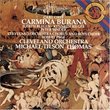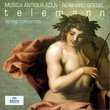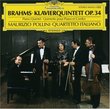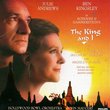| All Artists: Ludwig van Beethoven, Louis Spohr, Antonio Rosetti, Paul Dombrecht, Octophoros Title: Harmonie und Janitscharenmusik - Music for Harmonie and Janissary Band (Rosetti: Partita * Beethoven: Wellington's Victory * Spohr: Notturno) /Octophoros * Dombrecht Members Wishing: 0 Total Copies: 0 Label: Accent Plus Original Release Date: 1/1/1989 Re-Release Date: 3/25/2008 Album Type: Import Genres: Special Interest, Classical Styles: Marches, Chamber Music, Forms & Genres, Symphonies, Theatrical, Incidental & Program Music, Historical Periods, Classical (c.1770-1830) Number of Discs: 1 SwapaCD Credits: 1 UPC: 750582474422 |
Search - Ludwig van Beethoven, Louis Spohr, Antonio Rosetti :: Harmonie und Janitscharenmusik - Music for Harmonie and Janissary Band (Rosetti: Partita * Beethoven: Wellington's Victory * Spohr: Notturno) /Octophoros * Dombrecht
CD DetailsSimilar CDsSimilarly Requested CDs |
CD ReviewsA harmonie music lover's delight Larry VanDeSande | Mason, Michigan United States | 01/12/2008 (5 out of 5 stars) "This 1988 recording by Octophorous, a band of musicians that included bassoonist-cum-conductor Marc Minkowski, is a wonderful example of what can happen when a harmonie band -- or a woodwind band -- takes on nontraditional harmonie music. This recording includes two pieces written for harmonie, the Partita in F by Antonio Rosetti from 1785 and Louis Spohor's Notturno for Harmonie and Timpani in C major, Op. 34. Both are delightful examples of this exciting brand of music that was often played at formal and informal outdoor parties in the 1700s. Those royals knew how to keep themselves and their guests entertained! By far the most bizarre and exciting addition to this CD is the harmonie treatment of Beethoven's "Wellington's Victory", the military march and mimic of battle Ludwig von composed as his Op. 91. This arrangement is for 2 piccolos, 2 flutes, 2 oboes, 5 clarinets, 2 bassoons, contrabassoon, 4 horns, 6 trumpets, bass trombone, the magnificent serpent, a pair of drums, cymbals, drumband and cannons. The cannons are electronic and don't carry the weight of those in Dorati's famous version of the music. Still, this is the most exciting and enveloping recording I've ever heard of Beethoven's most fun score. This recording, which was once (and still may be available) through Musical Heritage Society, has otherwise been unavailable for years. If this sounds interesting to you, get it today for the modest price Amazon vendors ask. You won't be sorry. For more recommendations on magnificent harmonie music recordings, see my list, "Harmoniemusic worth hearing, seeking out and owning"." Some Wind-Band Delights M. C. Passarella | Lawrenceville, GA | 10/01/2008 (5 out of 5 stars) "A very successful concept album that explores two complimentary traditions in late-eighteenth century German music: the wind band, or Harmonie, and Janissary music.
The Bohemian composer Rosetti (a.k.a. Rossler) strikes me as one of the finer composers whose reputations live (if at all) in the long shadows cast by Haydn and Mozart. His symphonies have more style and substance than those of many of his contemporaries, and so with his Parthia in F, an attractive work for thirteen wind instruments. The last movement is a lively hunt-inspired jaunt with some hair-raisingly difficult writing for the three horns. The more I hear of Louis Spohr, the more I think he succeeds best in his less serious music. He had neither the gravitas nor the compositional chops to create truly memorable symphonies, but some of his chamber music and concerted music is charming and well worth hearing. The Notturno (1815), written in the tradition of eighteenth-century entertainment music such as the divertimento and cassation (or Rosetti's Parthia, for that matter), goes the tradition one better by capitalizing on the craze for Turkish music that captivated German composers from Gluck to Beethoven. The Turkish percussion gives Spohr's work a wonderfully open-air quality far removed from the stuffiness of the musical salon. Beethoven's Wellington's Victory, originally written for an orchestrion designed by metronome maker Johann Maelzel, is here given in a wind-band arrangement by a hand other than Beethoven's though apparently with the composer's approval. One of Beethoven's greatest hits during his lifetime, the piece was also widely disparaged by the cognoscenti, only to be rediscovered by hi-fi buffs in recordings featuring real, live cannon shots and musket volleys. In this recording, the ersatz cannons make little effect, especially compared to the hi-fi-spectacular treatment you get in, say, Erich Kunzel's rendering on Telarc. Still, Octophoros' performance is more unbuttoned, more rip-roaring than most recorded ones thanks in large part to the unbridled stridency of the upper winds and the authentic slam-bam of the Turkish battery. In Beethoven's orchestral version, the string section tends to cushion the blow, so to speak, but here, we have pure, glorious musical noise. Octophoros plays this piece with all requisite abandon and yet manages a good deal of suavity in the Rosetti and Spohr, making this a varied and thoroughly successful outing. Good, clear, even punchy sonics with the necessary stereo effects in the Beethoven. " |

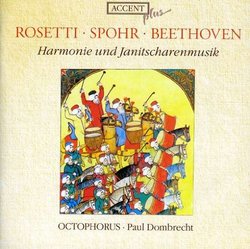
 Track Listings (12) - Disc #1
Track Listings (12) - Disc #1
